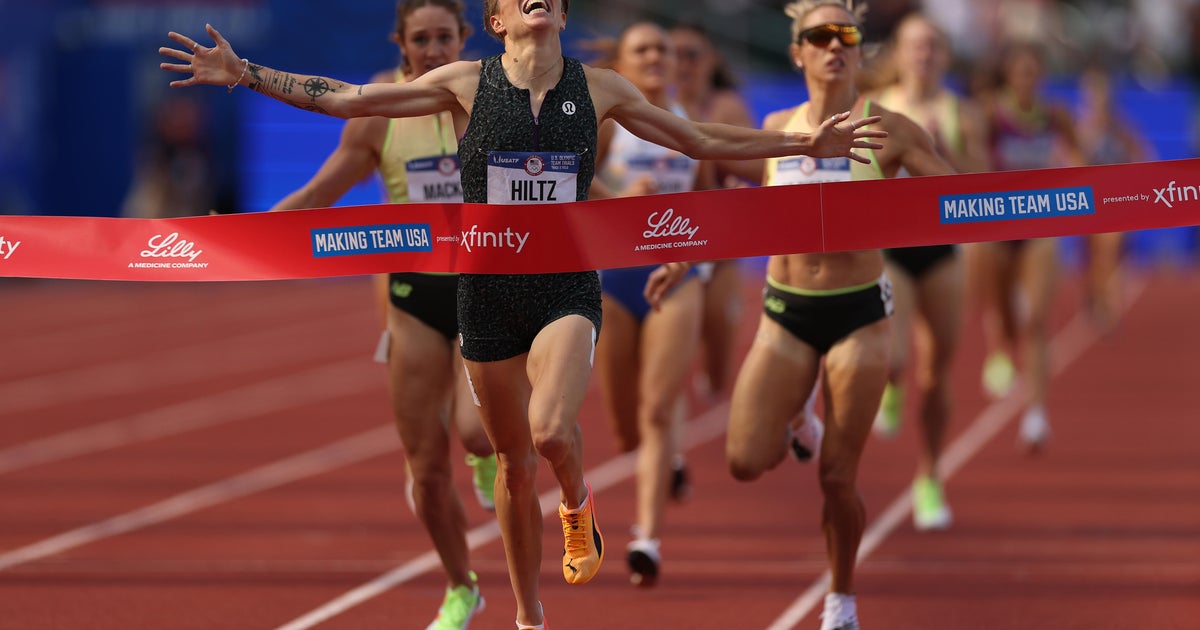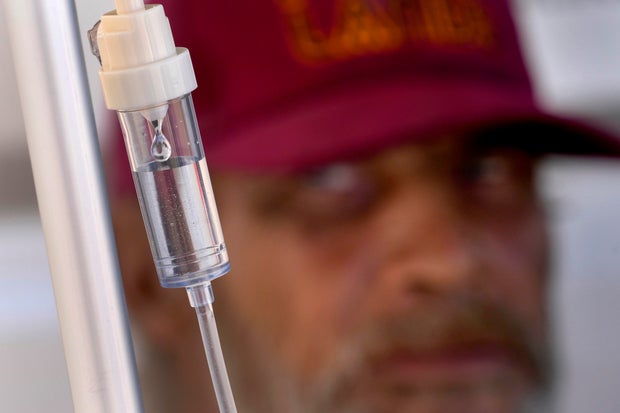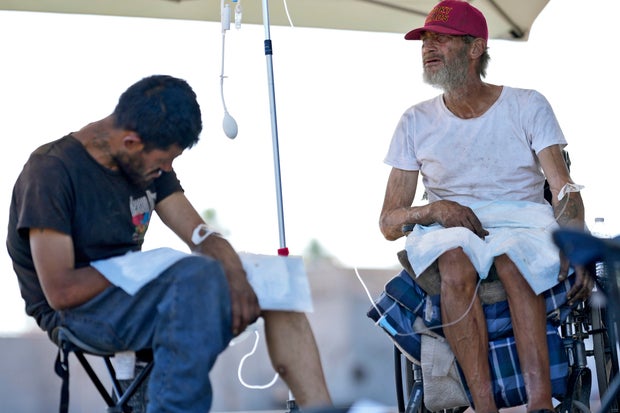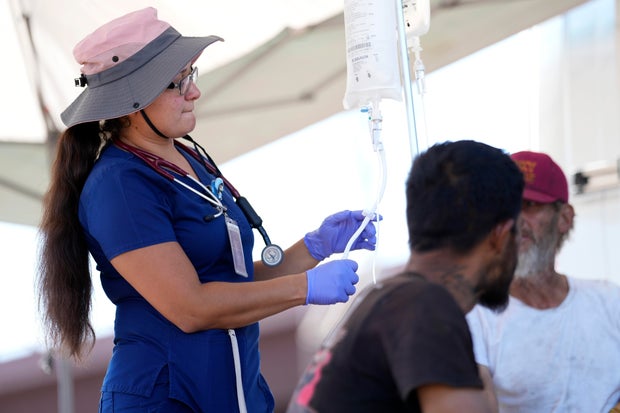CBS News
Long Island lawmakers to vote on whether to ban trans women athletes from competing in public facilities

A renewed fight over transgender rights is unfolding on Long Island, New York, as Nassau County lawmakers are set to vote on whether to ban transgender women athletes from competing in women’s teams in county-owned facilities.
In February, Nassau County Executive Bruce Blakeman signed an executive order denying permits to women’s or girl’s sporting events with transgender participants, barring them from using the county’s more than 100 public facilities.
“We started hearing from a lot of girls and a lot of women that they thought it was very unfair and very unsafe that biological males were competing in what is billed as all-girl teams or all-women teams,” Blakeman said of his decision.
The ban was a huge blow to the Long Island Roller Rebels, a flat-track roller derby team that counts several transgender players among their ranks.
“Where it starts is understanding that trans women are women and that we should just continue to categorize them as women,” said 33-year-old Amanda Urena, the president of the Long Island-based recreational group.
In March, the Roller Rebels, backed by the American Civil Liberties Union of New York, sued Nassau County over Blakeman’s executive order, arguing the policy violated the state’s Human Rights and Civil Rights Laws.
Last month, a judge ruled Blakeman acted “beyond the scope of his authority.”
Now, a similar measure is being considered by the Nassau County Legislature, which is made up of 12 Republicans and seven Democrats. The legislature’s rules committee voted to advance the bill Monday after it was introduced last week. A full vote is set for June 24.
Gabriella Larios, an attorney for the New York Civil Liberties Union, believes if the law passes it will be struck down because it violates state anti-discrimination laws.
“In 2019, New York amended its Human Rights Law and its Civil Rights Law to explicitly prohibit discrimination against transgender people,” Larios said.
Nearly 150 anti-LGBTQ bills are under consideration across the U.S., according to the ACLU. Of those, 21 target transgender athletes. Since Blakeman’s executive order, four other states have come closer to passing bills targeting transgender athletes.
Urena says the Roller Rebels’ fight is “about protecting people’s rights to be able to participate in the activities that have been paid for by their communities through taxes.”
“We fully believe we are standing in the right place in history, and that we are standing up for Nassau County. We’re standing up for people’s rights,” Urena said.
When asked what he would say to transgender women who believe their rights aren’t being protected, Blakeman said, “What about the rights of women? Compete in a co-ed league, form a transgender league. We’re not anti-transgender. We are pro-women.”
The Roller Rebels have gotten around the opposition for now by renting out private spaces for their late-night practices. In what they call a fight for justice, their attitude is: where there’s a will, there’s a way to keep rolling.
CBS News
Meet the designer turning classic Venetian glass into modern art

Watch CBS News
Be the first to know
Get browser notifications for breaking news, live events, and exclusive reporting.
CBS News
Minnesota Vikings rookie Khyree Jackson dies in car accident

MINNEAPOLIS — Minnesota Vikings rookie Khyree Jackson died overnight in a car accident.
The Upper Marlboro, Maryland native played for Alabama and Oregon. He was drafted by the Vikings in April in round 4 as the 108th overall pick.
He was 24 years old.
“Our thoughts are with Khyree’s family, friends, teammates and coaches, as well as all the victims of this tragic accident,” the Vikings wrote on X.
Vikings head coach Kevin O’Connell said he was “crushed” by the news of Jackson’s death.
“In our short time together, it was evident Khyree was going to develop into a tremendous professional football player, but what was more impressive was his desire to become the best person he could be for his family and those around him,” O’Connell added.
The crash happened in Upper Marlboro shortly after 3 a.m. and involved three cars, according to Maryland state police. Investigators believe the driver of a silver Infiniti car tried to change lanes at a high rate of speed and struck the car that Jackson was in, as well as a Chevrolet Impala.
The two other occupants of Jackson’s car also died in the crash. The occupants of the other cars were not hurt.
Officials believe that alcohol could have been a contributing factor in the crash.
In a statement, the Minnesota Vikings say they have offered support to Jackson’s family, and are offering counseling and emotional support to the players who seek it.
This is a developing story. Check back with WCCO.com for more.
Note: The above video first aired on June 24, 2024.
CBS News
Street medics treat heat illnesses among homeless people as temperatures rise

Alfred Handley leaned back in his wheelchair alongside a major Phoenix freeway as a street medicine team helped him get rehydrated with an intravenous saline solution dripping from a bag hanging on a pole.
Cars whooshed by under the blazing 96-degree morning sun as the 59-year-old homeless man with a nearly toothless smile got the help he needed through a new program run by the nonprofit Circle the City.
“It’s a lot better than going to the hospital,” Handley said of the team that provides health care to homeless people. He’s been treated poorly at traditional clinics and hospitals, he said, more than six years after being struck by a car while he sat on a wall, leaving him in a wheelchair.
Circle the City, a non-profit that works in multiple cities and hospitals and treats about 9,000 people annually, introduced its IV rehydration program as a way to protect homeless people in Phoenix from life-threatening heat illness as temperatures regularly hit the triple-digits in America’s hottest metro.
Matt York / AP
Homeless people accounted for nearly half of the record 645 heat-related deaths last year in Maricopa County, which encompasses metro Phoenix. As summers grow warmer, health providers from San Diego to New York are being challenged to better protect homeless patients.
Dr. Liz Frye, vice chair of the Street Medicine Institute which provides training to hundreds of healthcare teams worldwide, said she didn’t know of groups other than Circle the City administering IVs on the street. The organization also distributes tens of thousands of water bottles each summer and tries to educate people about hot weather dangers.
“But if that’s what needs to happen to keep somebody from dying, I’m all about it,” Frye said.
Bringing care to people in need
The amount of people requiring treatment for heat illnesses is rising. The Boston Health Care for the Homeless Program, featured in last year’s book, “Rough Sleepers,” now sees patients with mild heat exhaustion in the summer after decades of treating people with frostbite and hypothermia during the winter, said Dr. Dave Munson, the street team’s medical director.
“It’s certainly something to worry about,” said Munson, noting that temperatures in Boston hit 100 degrees with 70% humidity during June’s heat wave. Homeless people, he said, are vulnerable to very hot and very cold weather not only because they live outside, but they often can’t regulate body temperature due to medication for mental illness or high blood pressure, or because of street substance use.
The Phoenix team searches for patients in homeless encampments in dry riverbeds, sweltering alleys and along the canals that bring water to the Phoenix area. About 15% are dehydrated enough for a saline drip.
Matt York / AP
“We go out every day and find them,” said nurse practitioner Perla Puebla. “We do their wound care, medication refills for diabetes, antibiotics, high blood pressure.”
Puebla’s street team ran across Handley and 36-year-old Phoenix native Phillip Enriquez near an overpass in an area frequented by homeless people because it’s near a facility offering free meals. Across the road was an encampment of tents and lean-tos along a chain-link fence.
Enriquez sat on a patch of dirt as Puebla started a drip for him. She also gave him a prescription for antibiotics and a referral to a dentist for his dental infection.
Living outside in Arizona’s broiling sun is hard, especially for people who may be mentally ill or use sedating drugs like fentanyl that make them less aware of their surroundings. Stimulants like methamphetamine contribute to dehydration, which can be fatal. Dr. Matt Essary, who works with Circle in the City’s mobile clinics, said the organization also often treats surface burns that can happen when a medical emergency or intoxication causes someone to fall on a sizzling sidewalk.
Matt York / AP
Temperatures this year have reached 115 degrees in metro Phoenix, where six heat-related deaths have been confirmed through June 22. Another 111 are under investigation, and the city is seeing an “increasing” number of patients with heat illnesses every year, according to Dr. Aneesh Narang, the assistant medical director of emergency medicine at Banner Medical Center-Phoenix, which treats many homeless people with heat stroke.
Narang’s staff works frequently with Circle the City, whose core mission is providing respite care, with 100 beds for homeless people not well enough to return to the streets after a hospital stay.
Extreme heat worldwide requires a dramatic response, said physician assistant Lindsay Fox, who cares for homeless people in Albuquerque, New Mexico, through an initiative run by the University of New Mexico’s School of Medicine.
Three times weekly, Fox treats infections, cleans wounds and manages chronic conditions in consultation with hospital colleagues. She said the prospect of more heat illness worries her.
Highs in Albuquerque can hit the 90s and don’t fall enough for people living outside to cool off overnight, she said.
“If you’re in an urban area that’s primarily concrete, you’re retaining heat,” she said. “We’re seeing heat exposure that very quickly could go to heat stroke.”
Serious heat stroke is far more common in metro Phoenix, where Circle the City is now among scores of health programs for the homeless in cities like New York, San Diego and Spokane, Washington.
Circle the City works with medical staff in seven Phoenix hospitals to help homeless patients get after-care when they no longer need hospitalization. It also staffs two outpatient clinics for follow-up.
Rachel Belgrade waited outside Circle the City’s retrofitted truck with her black-and-white puppy, Bo, for Essary to write a prescription for the blood pressure medicine she lost when a man stole her bicycle. She accepted two bottles of water to cool off as the morning heat rose.
“They make all of this easier,” said Belgrade, a Native American from the Gila River tribe. “They don’t give you a hard time.”












